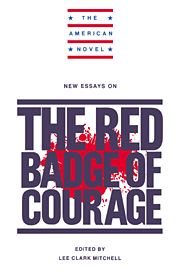Book contents
- Frontmatter
- Contents
- Series Editor's Preface
- Note on the Text
- 1 Introduction
- 2 Getting Used to the “Original Form” of The Red Badge of Courage
- 3 The American Stephen Crane: The Context of The Red Badge of Courage
- 4 The Spectacle of War in Crane's Revision of History
- 5 “He Was a Man”
- 6 Ill Logics of Irony
- Notes on Contributors
- Selected Bibliography
6 - Ill Logics of Irony
Published online by Cambridge University Press: 08 January 2010
- Frontmatter
- Contents
- Series Editor's Preface
- Note on the Text
- 1 Introduction
- 2 Getting Used to the “Original Form” of The Red Badge of Courage
- 3 The American Stephen Crane: The Context of The Red Badge of Courage
- 4 The Spectacle of War in Crane's Revision of History
- 5 “He Was a Man”
- 6 Ill Logics of Irony
- Notes on Contributors
- Selected Bibliography
Summary
Some interpretive conventions
All these conflicting interpretations of Red Badge's two texts suggest that irony resides not in the text (whether in a sentence or a whole chapter) but in the critic's interpretive conventions.
–Steven MaillouxWhat I propose to show is how unstable are the major concepts in The Red Badge of Courage – how they deconstruct themselves as we read so that the irony, which has been the element most resistant to new modes of understanding this text, is bound to be unstable. Four major oppositions include the hero/the monster, running to/running from, separation/membership, and spectator/spectacle, all of which are intertwined with each other and caught up in the opposition that subsumes them – that of courage/cowardice. The whole of that deconstructive swallowing act is itself part of a more basic in/out opposition that comes into play in the outsideness or the insideness of the author. “Irony,” in other words, operates throughout the narrative.
Many critics who have disagreed about Crane's irony take the term “irony” for granted, usually in two ways: They evaluate it positively, assuming that the author's attitude toward his character must be clear; and they do not go into its technique. The positive evaluation of irony has been questioned by Sontag (1969) and Barthes (1970), and reversed by Bakhtin (1929a), for whom irony is on the side of “monological” discourse. However complex the viewpoints in such discourse, the author is always in control and has the last word on his characters.
- Type
- Chapter
- Information
- New Essays on The Red Badge of Courage , pp. 129 - 146Publisher: Cambridge University PressPrint publication year: 1986
- 1
- Cited by

